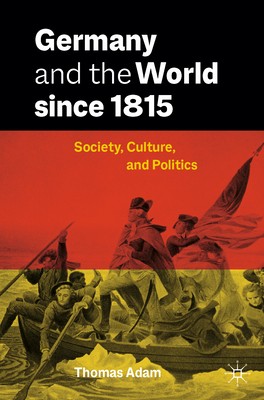
- We will send in 10–14 business days.
- Author: Thomas Adam
- Publisher: Palgrave Macmillan
- ISBN-10: 303163389X
- ISBN-13: 9783031633898
- Format: 15.6 x 23.4 x 1.8 cm, kieti viršeliai
- Language: English
- SAVE -10% with code: EXTRA
Reviews
Description
This textbook provides a history of modern Germany, locating the country's social, cultural, and political developments within their proper global and transnational context. The author argues that most developments in German culture, society, and politics throughout the nineteenth and twentieth centuries were caused by wider global and transnational trends. A history of the German people rather than the German state, the book focusses on non-state and non-government actors, intercultural transfers, and applies the approach of 'thick description' to analysing the creation of German culture, society, and identity from the era of the Napoleonic wars right up to the present post-unification Germany. This includes an examination of German migrants' journeys to their new homes in the Americas and, thus, the creation of a global German diaspora with cultural and social networks beyond its home country's borders. The book further focusses on the transfers that connected German society and culture with those of other countries; for instance, chapters cover the transfer of soccer from England to Germany, the transfer of the Christmas holiday tradition from Germany to other countries, and the development of eugenics in Germany within its global context.
EXTRA 10 % discount with code: EXTRA
The promotion ends in 23d.06:43:20
The discount code is valid when purchasing from 10 €. Discounts do not stack.
- Author: Thomas Adam
- Publisher: Palgrave Macmillan
- ISBN-10: 303163389X
- ISBN-13: 9783031633898
- Format: 15.6 x 23.4 x 1.8 cm, kieti viršeliai
- Language: English English
This textbook provides a history of modern Germany, locating the country's social, cultural, and political developments within their proper global and transnational context. The author argues that most developments in German culture, society, and politics throughout the nineteenth and twentieth centuries were caused by wider global and transnational trends. A history of the German people rather than the German state, the book focusses on non-state and non-government actors, intercultural transfers, and applies the approach of 'thick description' to analysing the creation of German culture, society, and identity from the era of the Napoleonic wars right up to the present post-unification Germany. This includes an examination of German migrants' journeys to their new homes in the Americas and, thus, the creation of a global German diaspora with cultural and social networks beyond its home country's borders. The book further focusses on the transfers that connected German society and culture with those of other countries; for instance, chapters cover the transfer of soccer from England to Germany, the transfer of the Christmas holiday tradition from Germany to other countries, and the development of eugenics in Germany within its global context.


Reviews